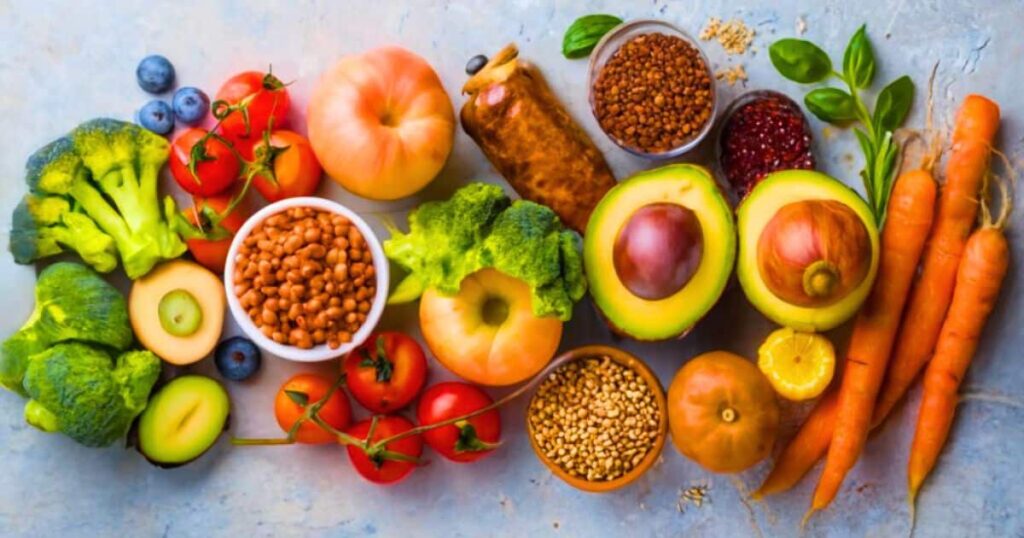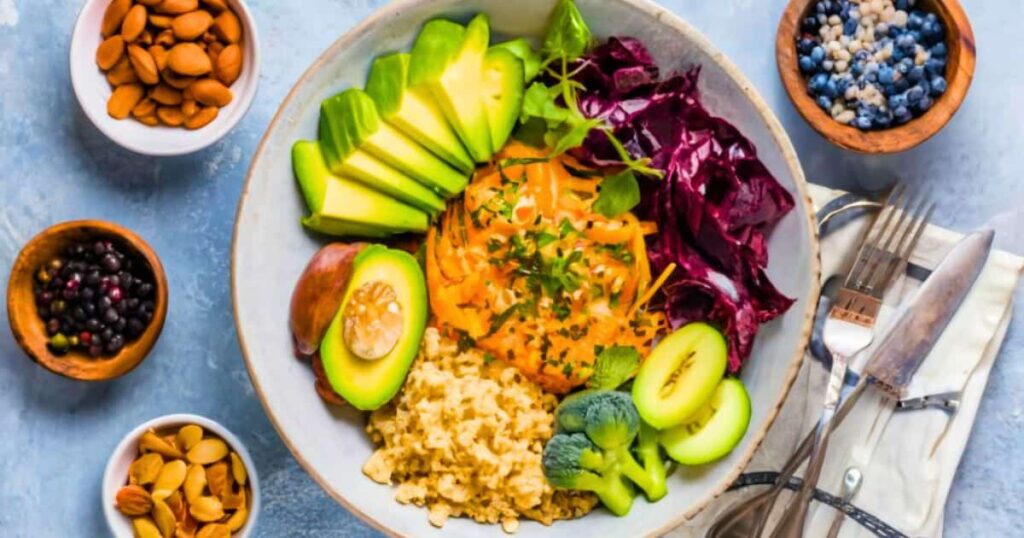Have you ever thought that life is playing a never ending game of snooze?
Does the prospect of that illusory rush of energy make you struggle through each day? Many individuals can relate if that’s the case. A typical complaint is exhaustion, but that doesn’t mean it has to be your daily reality.
Not only does the quantity of sleep you obtain have an influence, but so does the food you eat. Eating a balanced diet rich in whole foods can provide your body with the essential nutrients and energy it needs to function optimally.
Avoiding processed foods high in sugar and unhealthy fats can help combat fatigue and boost your energy levels throughout the day.
Additionally, staying hydrated and incorporating regular physical activity into your routine can also help combat feelings of exhaustion. By making small changes to your diet and lifestyle, you can improve your energy levels and feel more vibrant each day.
Discover seven power meals that will transform your energy levels and leave you feeling invigorated all day long as this article goes into the area of energizing foods.

Why are some foods more energized than others?
First let’s get a grip on why some alternatives make you feel tired and others provide you with a natural energy boost before we delve into the particular foods that stimulate.
How your body transforms food into energy is the decisive element. When you consume foods high in sugar or processed carbohydrates, your body experiences a spike in blood sugar levels followed by a crash, leaving you feeling fatigued.
On the other hand, foods rich in fiber, protein, and healthy fats provide a steady release of energy throughout the day. Understanding these differences can help you make better choices for sustained energy levels and overall well-being.
Carbohydrates are the body’s preferred source of energy.
However, not all carbs are created equal. Simple carbohydrates, found in sugary meals and processed grains generate a fast boost in blood sugar levels followed by a crash, leaving you feeling weary.
Complex carbohydrates, on the other hand, are rich with fiber, which slows down the release of sugar into the circulation, offering lasting energy. This means that foods like whole grains, fruits, and vegetables are a better choice for sustained energy throughout the day.
Additionally, complex carbohydrates also provide essential nutrients that are necessary for optimal health and well-being. By choosing foods high in complex carbohydrates, you can help maintain stable blood sugar levels and avoid the energy crashes associated with simple carbohydrates.
Protein is another crucial element. It helps develop and repair tissues, improves satiety, and keeps your metabolism revved up, all of which contribute to sustained energy levels.
Healthy fats also have a function.
They deliver sustained energy, aid in meal absorption, and boost feelings of fullness. Additionally, healthy fats are important for brain function and hormone production.
Including a balance of proteins, healthy fats, and carbohydrates in your diet can help regulate blood sugar levels and provide sustained energy throughout the day.
It’s important to focus on whole, nutrient-dense foods to ensure you are getting the right combination of nutrients for optimal energy levels and overall health.

The Magnificent Seven Energy Boosting Food Powerhouses
Now, let’s meet the magnificent seven a variety of foods that may greatly improve your energy:
1. Fatty Fish:
Packed with omega-3 fatty acids, particularly EPA and DHA, fatty fish like salmon, tuna, sardines, and mackerel are champions of energy.
Omega-3s perform a key role in brain function, decreasing inflammation, and improving blood flow, all of which contribute to improved endurance and less tiredness. Adding fatty fish to your diet can also help reduce muscle soreness and aid in post-workout recovery, allowing you to push yourself harder during exercise.
In addition, the high protein content in fatty fish can help repair and build muscle tissue, further enhancing your stamina and overall physical performance. Including these nutritional powerhouses in your meals can make a significant difference in your energy levels and endurance, helping you reach your fitness goals more effectively.
2. Leafy green vegetables:
Don’t underestimate the force of these emerald powerhouses. Leafy greens like kale, spinach, and Swiss chard are filled with vital vitamins and minerals, including iron, folate, and magnesium.
These nutrients are necessary for energy production and help offset fatigue generated by deficiencies. Incorporating these vegetables into your diet can provide a natural and healthy way to boost your energy levels and combat feelings of tiredness.
Additionally, leafy greens are high in antioxidants, which can help reduce inflammation in the body and improve overall health. So next time you’re feeling sluggish, reach for a green smoothie or salad to revitalize your body and mind.
3. Whole Grains:
Unlike their processed counterparts, whole grains are loaded with complex carbohydrates, fiber, and B vitamins a winning combination for sustained energy. Whole grains like brown rice, quinoa, oats, and whole-wheat bread deliver a steady and continuous release of glucose into the circulation, keeping you fueled for longer.
This helps stabilize blood sugar levels and prevents energy crashes throughout the day. In addition, the fiber content in whole grains aids in digestion and helps you feel full and satisfied, reducing the likelihood of unhealthy snacking. Incorporating whole grains into your diet can also lower your risk of heart disease, stroke, and certain types of cancer.
4. Nuts and seeds:
These little nutritional powerhouses are superb sources of healthy fats, protein, fiber, B vitamins, and vital minerals like magnesium and iron. Nuts and seeds, including almonds, walnuts, chia seeds, and flaxseeds, induce satiety, enhance blood sugar management, and deliver a sustained energy boost.
Incorporating a variety of nuts and seeds into your diet can also help lower cholesterol levels and reduce the risk of heart disease.
Additionally, their antioxidant properties can help protect against inflammation and oxidative stress in the body. Overall, nuts and seeds are a delicious and convenient way to support overall health and well-being.
5. Lentils and beans:
A vegetarian’s best buddy, lentils and beans provide a budget-friendly supply of complex carbohydrates, protein, and fiber. They are also rich in iron, which helps deliver oxygen throughout the body, promoting energy creation.
In addition, lentils and beans are versatile ingredients that can be used in a variety of dishes, from soups and stews to salads and dips.
They are also a great source of folate, potassium, and magnesium, contributing to overall heart health and muscle function. Including lentils and beans in your diet can help you feel full and satisfied, while also supporting your overall health and well-being.
6. Fruits:
Nature’s sweets and fruits provide an easily accessible source of natural sugars, vitamins, minerals, and fiber. Choose fruits with a lower glycemic index, such as berries, apples, pears, and oranges, for a prolonged energy boost that won’t lead to a blood sugar dip.
These fruits are also packed with antioxidants that help protect your cells from damage. Incorporating a variety of fruits into your diet can help support your immune system, digestion, and overall health. Plus, their natural sweetness makes them a delicious and nutritious alternative to processed sweets and desserts.
7. Greek Yogurt:
This creamy delight is a protein powerhouse. Greek yogurt is a superb source of slow-digesting protein, which keeps you feeling full and energetic for longer. It also contains probiotics, which help promote digestive health and maybe increase energy levels.
Additionally, Greek yogurt is packed with nutrients like calcium, potassium, and vitamin B12, making it a well-rounded and nutritious choice for any meal or snack.
The versatility of Greek yogurt allows it to be enjoyed in a variety of ways, whether topped with fruit and granola for breakfast or used as a base for creamy dressings and dips. Including Greek yogurt in your diet can be a delicious and beneficial way to support your overall health and wellness.
Pro Tip: Don’t forget about hydration! Dehydration may severely sap your energy. Aim to drink plenty of water throughout the day to stay energetic and focused.
Frequently Asked Questions FAQs :
Can sugary drinks give you an energy boost?
Sugary drinks may provide you with a short energy surge, but the crash that follows is likely to leave you feeling worse. Opt for water, unsweetened tea, or coffee instead.
What about coffee? Is it a good source of energy?
Coffee may be a great tool for improving alertness, but it’s not a long-term solution for energy. Limit your coffee utilization and focus on integrating the energetic things specified above into your diet.
Are there any foods I should avoid for lasting energy?
Processed meals, sugary sweets, processed carbs, and excessive saturated and harmful fats may all contribute to tiredness. It’s suggested to limit these meals and focus on a whole-food, balanced diet.





